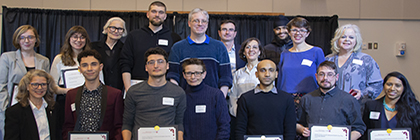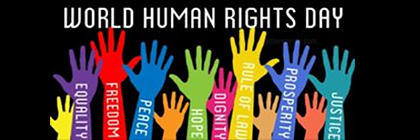Faculty of Liberal Arts & Professional Studies (LA&PS) Associate Professor of politics Karen Bridget Murray was an invited speaker at a juried workshop held on Sept. 26 and 27 at King’s College in London, England.

Murray’s talk, “Epigenetics and Politics: Engaging the Colonial Present,” was part of a two-day interdisciplinary workshop aimed at building an international research network that focuses on the ways that race and biomedicine are mobilized beyond the lab in the 21st century. The 28 workshop participants were drawn from universities on five continents, 10 countries and from across the spectrum of academic life.
Murray was the only scholar from a Canadian university participating in the workshop. She spoke about ideas introduced in two of her recently published articles, the first, “Epigenetics and Politics in the Colonial Present,” was published in 2018 in the Canadian Journal of Sociology; and the second, “Bio-gentrification: Vulnerability Bio-value Chains in Gentrifying Neighbourhoods,” was published in 2015 in Urban Geography. Murray’s presentation highlighted how an epigenetic style of thought has been translated into concrete governmental practices in the context of Canada, and British Columbia in particular. She noted that epigenetic reason emphasizes how gene-environmental interactions shape genetic expression, even while genes do not change. She sketched out how epigenetic logics have underpinned the creation of the Early Development Instrument (EDI), a widely used survey tool that is the basis of a statistically defined population classification referred to as child “vulnerability.”
Murray argued that it is important to consider the political implications arising from the translation of epigenetic thinking, such as how EDI research has been drawn upon in the shaping of governance practices and, that there can be potentially problematic implications. Examining the translation of epigenetic logics through the EDI and into public policy is pertinent beyond British Columbia, Murray maintained. The scope of policy adaptions of EDI research has yet to be fully and critically documented and evaluated. What is clear, she said, is that EDI-based research has a global reach, including several regional implementations among the 30 countries where EDI data collections at various scales are undertaken.
“It is essential that sustained attention be paid to how epigenetic logics are shaping governmental practices,” Murray said, adding “epigenetics is not a settled science, but it is at times drawn upon in public policy as if it were. We need to understand how and why this is happening and to what ramifications, especially since some are raising alarm bells about new eugenics.”
Reflecting on her experience in London, Murray said she was “honoured to have been part of the King’s College event. It offered an unprecedented chance to be part of a newly launched global research network, which in turn has opened space for future collaborative endeavours that could create opportunities for York University graduate students as well.”
Murray’s trip was made possible with funding from the LA&PS, specifically a Seed Grant for Collaborative Research. LA&PS Minor Research Grants, and a York Social Science & Humanities Research Council of Canada (SSHRC) Small Research Grants, have supported Murray’s research.











 The declaration stipulates universal values and a shared standard of achievement for everyone in every country. While the declaration is not a binding document, it inspired more than 60 human rights instruments that today make a common standard of human rights. It is the most translated document around the globe – available in more than 500 languages.
The declaration stipulates universal values and a shared standard of achievement for everyone in every country. While the declaration is not a binding document, it inspired more than 60 human rights instruments that today make a common standard of human rights. It is the most translated document around the globe – available in more than 500 languages.




 The launch of the book, a key text in the growing field of Canadian environmental history, was supported by the
The launch of the book, a key text in the growing field of Canadian environmental history, was supported by the 




 Get writing! The President’s Prizes in Creative Writing Competition is seeking original pieces in one or all of the following genres: poetry, short fiction, screenplay and stageplay.
Get writing! The President’s Prizes in Creative Writing Competition is seeking original pieces in one or all of the following genres: poetry, short fiction, screenplay and stageplay.